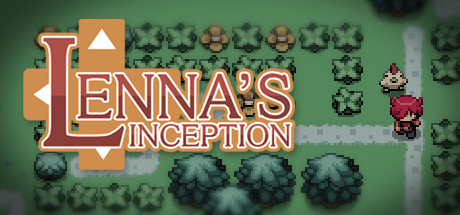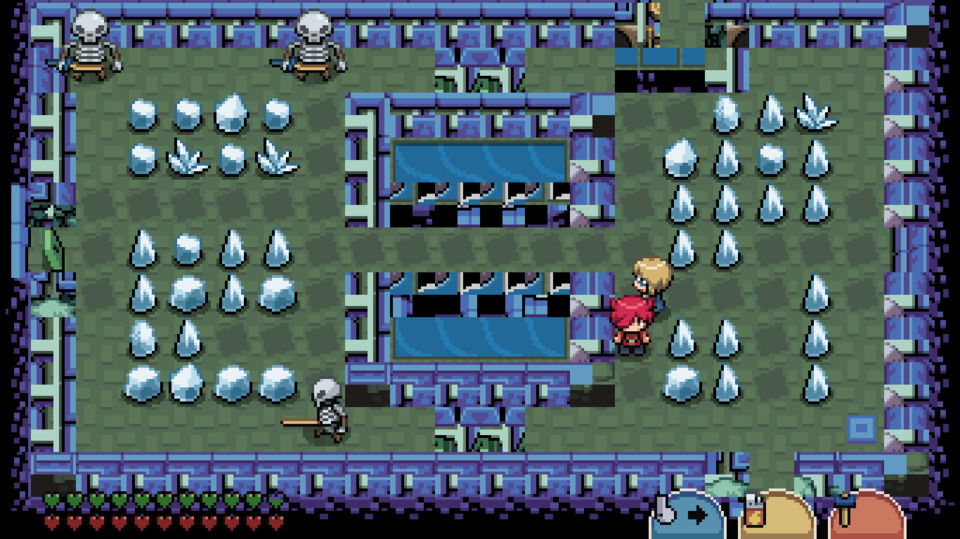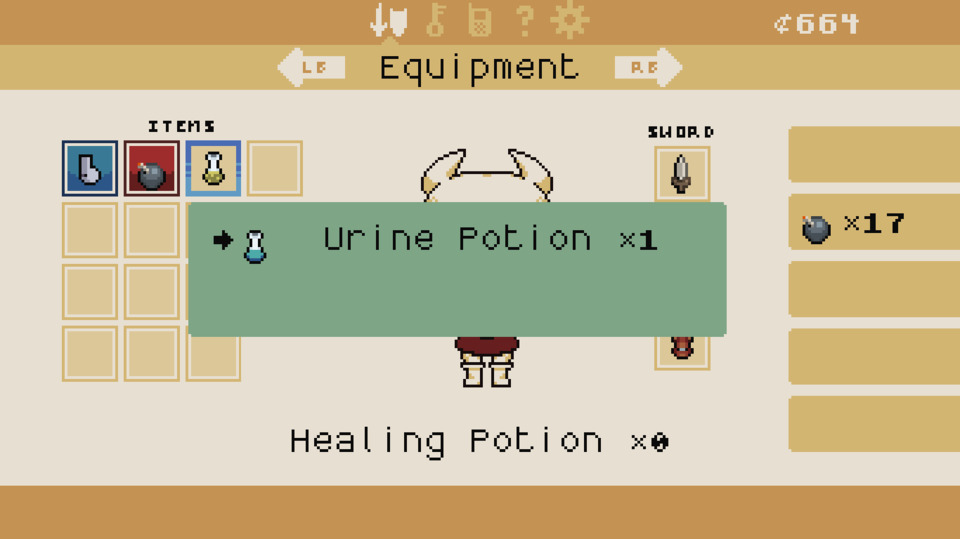
- Game: Bytten Studio's Lenna's Inception
- Release Month: January.
- Quick Look: N/A.
- Started: 12/12.
- Completed: 12/12.
I feel like whenever I talk about an Indie action-adventure game clearly and purposefully built on the framework of the Legend of Zelda, I always gravitate towards my pet theory that every Indie Zelda-like emphasizes or de-emphasizes portions of the trinity, or triforce if you will, of that franchise's mix of open-world exploration, puzzle-solving, and real-time combat. However, there are also a handful of cases like Anodyne or today's game Lenna's Inception where the Zelda parallels aren't so much intended as a launching point for the developer's spin on that type of game, but instead serve as the foundation for some meta narrative trickery couched in a familiar framework.
The protagonist of the game, Lenna (though the player can rename her), is a schoolteacher in a very Zelda-like kingdom of vaguely medieval villagers and packs of slimes and other monsters roaming around just outside of civilization. Her school unexpectedly glitches into error code, trapping the kids inside, and in the process of finding a solution comes across the silent hero "Lance," wearing a familiar hooded tunic, and determines that it's her task as a teacher NPC to walk him through the tutorial so that he might save the world and restore her school. Lance then immediately croaks, and Lenna finds herself begrudgingly picking up his mantle as the world's chosen one. The plot goes through a few more twists and turns that I don't need to spoil, except to say that the data corruption - which originated elsewhere in the world by an accidental item underflow glitch, perhaps familiar to those who follow Pokémon speedruns - is an important development that the game sidelines for most of the playthrough. Beyond that element, however, the game is largely perfunctory Zelda game: there are eight dungeons, each of which concludes with a boss fight that adds to the player's max health and each contains a new traversal item or weapon Lenna needs to make progress.

One distinctive trait of the game that I've seen a few other Zelda-likes attempt, with very mixed results, is procedural generation. The world is generated anew each time you start, with the world's name also doubling as its seed. The game has a few example names for players to use if they can't think of one themselves, and it serves to reassemble the overworld, the items you obtain and in what order, and the layouts of the dungeons. However, as with most procgen projects, this only serves to make every dungeon feel the same, with similar "tiles" that you'll encounter over and over and enemy arrangements with inconsistent difficulty curves. If inputting a seed name wasn't a giveaway that the game has Rogue aspirations, the game's many potion types are initially unlabelled save for their color and consistency: a "fizzy red potion" could be anything from a heal, to increased fire resistance, to hovering or giant growth (both useful to brute force some puzzles), to many detrimental effects like poison, reversed controls, or slowness. The same is true for the many hues of tunic that the protagonist can wear, which provide a permanent version of the potion effect for as long as it's worn. The game's randomized "mini-dungeons," non-essential to progress but often containing helpful heart pieces or meteorite upgrade materials, will also have enemies under several simultaneous potion effects for a bit of variety.
The problem with Lenna's Inception as a procgen game is that there's very few monster types and dungeon tiles and so it feels like you've seen most of what the game has to offer within a few hours. It starts getting interesting again towards the end where there's a dungeon that encourages (and, in fact, requires) you to break the game and wander outside in the "out of bounds" areas, but before that it's a lot of generic randomized dungeons that suffer from procgen's intrinsic lack of creative direction. The overworld isn't all that interesting either, being built with a similar algorithm, and as far as I can tell the purpose for going the procgen route is twofold: to facilitate speedruns or harder playthroughs with additional harsh conditions (limited health, permadeath), and a "true ending" that is so obtuse and requires such specific steps that you'll almost certainly need to start over with a fresh run to see it. I'm typically not going to look fondly on a game that demands you play it several times over to get the most out of it, especially if I was already getting bored of it during the first playthrough, but I suppose I can at least see the logic of this approach. I think we're probably still a ways from implementing procgen effectively in anything other than short session run-based games like Spelunky or Hades, or games where the destination doesn't matter as much as the journey (e.g. No Man's Sky), and I wish the Indie game development sphere used it more sparingly.

I will say that the story and the meta way it factors in programming faults and bugs is kinda cool, in the same reality-busting manner that Axiom Verge tackled the explormer genre a few years back, and I appreciated quality-of-life features like the bicycle fast-travel system (which sneaks in another Pokémon reference), a NPC follower system that made fights quicker and sometimes added extra lines of dialogue to cutscenes, and a two-player mode if you wanted to take on a seed with a friend. Just taken purely as A Link to the Past ersatz it plays well enough and offers enough side-quests and interesting boss fights to take on, as long as you don't mind the long stretches of uninteresting procgen exploration in-between. I dunno, for what it's worth I liked it more than Songbringer, the last procgen Zelda-like I played.
GOTY Verdict: Hovering near the bottom of the top-ten, likely to get pushed out by next year's adjustment.

Log in to comment